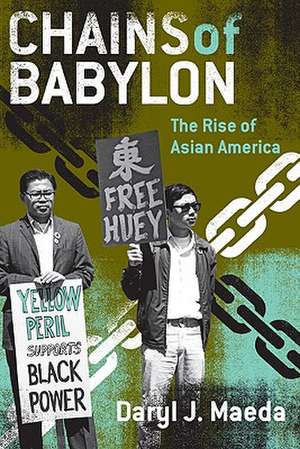Chains of Babylon: The Rise of Asian America: Critical American Studies
Autor Daryl J. Maedaen Limba Engleză Paperback – 20 oct 2009
In Chains of Babylon, Daryl J. Maeda presents a cultural history of Asian American activism in the late 1960s and early 1970s, showing how the movement created the category of "Asian American" to join Asians of many ethnicities in racial solidarity. Drawing on the Black Power and antiwar movements, Asian American radicals argued that all Asians in the United States should resist assimilation and band together to oppose racism within the country and imperialism abroad.
As revealed in Maeda's in-depth work, the Asian American movement contended that people of all Asian ethnicities in the United States shared a common relationship to oppression and exploitation with each other and with other nonwhite peoples. In the early stages of the civil rights era, the possibility of assimilation was held out to Asian Americans under a model minority myth. Maeda insists that it was only in the disruption of that myth for both African Americans and Asian Americans in the 1960s and 1970s that the full Asian American culture and movement he describes could emerge. Maeda challenges accounts of the post-1968 era as hopelessly divisive by examining how racial and cultural identity enabled Asian Americans to see eye-to-eye with and support other groups of color in their campaigns for social justice.
Asian American opposition to the war in Vietnam, unlike that of the broader antiwar movement, was predicated on understanding it as a racial, specifically anti-Asian genocide. Throughout he argues that cultural critiques of racism and imperialism, the twin "chains of Babylon" of the title, informed the construction of a multiethnic Asian American identity committed to interracial and transnational solidarity.
As revealed in Maeda's in-depth work, the Asian American movement contended that people of all Asian ethnicities in the United States shared a common relationship to oppression and exploitation with each other and with other nonwhite peoples. In the early stages of the civil rights era, the possibility of assimilation was held out to Asian Americans under a model minority myth. Maeda insists that it was only in the disruption of that myth for both African Americans and Asian Americans in the 1960s and 1970s that the full Asian American culture and movement he describes could emerge. Maeda challenges accounts of the post-1968 era as hopelessly divisive by examining how racial and cultural identity enabled Asian Americans to see eye-to-eye with and support other groups of color in their campaigns for social justice.
Asian American opposition to the war in Vietnam, unlike that of the broader antiwar movement, was predicated on understanding it as a racial, specifically anti-Asian genocide. Throughout he argues that cultural critiques of racism and imperialism, the twin "chains of Babylon" of the title, informed the construction of a multiethnic Asian American identity committed to interracial and transnational solidarity.
Preț: 181.25 lei
Nou
Puncte Express: 272
Preț estimativ în valută:
34.69€ • 36.08$ • 28.64£
34.69€ • 36.08$ • 28.64£
Carte tipărită la comandă
Livrare economică 12-26 aprilie
Preluare comenzi: 021 569.72.76
Specificații
ISBN-13: 9780816648917
ISBN-10: 0816648913
Pagini: 248
Ilustrații: 7
Dimensiuni: 140 x 216 x 18 mm
Greutate: 0.27 kg
Ediția:1
Editura: University of Minnesota Press
Colecția Univ Of Minnesota Press
Seria Critical American Studies
ISBN-10: 0816648913
Pagini: 248
Ilustrații: 7
Dimensiuni: 140 x 216 x 18 mm
Greutate: 0.27 kg
Ediția:1
Editura: University of Minnesota Press
Colecția Univ Of Minnesota Press
Seria Critical American Studies
Notă biografică
Daryl J. Maeda is assistant professor of ethnic studies at the University of Colorado-Boulder, where he teaches Asian American studies and comparative ethnic studies.
Cuprins
Preface
Acknowledgments
Abbreviations
Introduction: From Heart Mountain to Hanoi
1. Before Asian America
2. "Down with Hayakawa!" Assimilation vs. Third World Solidarity at San Francisco State College
3. Black Panthers, Red Guards, and Chinamen: Constructing Asian American Identity through Performing Blackness
4. Are We Not Also Asians? Building Solidarity through Opposition to the Viet Nam War
5. Performing Radical Culture: A Grain of Sand and the Language of Liberty
Conclusion: Fighting for the Heart of Asian America
Notes
Bibliography
Index
Acknowledgments
Abbreviations
Introduction: From Heart Mountain to Hanoi
1. Before Asian America
2. "Down with Hayakawa!" Assimilation vs. Third World Solidarity at San Francisco State College
3. Black Panthers, Red Guards, and Chinamen: Constructing Asian American Identity through Performing Blackness
4. Are We Not Also Asians? Building Solidarity through Opposition to the Viet Nam War
5. Performing Radical Culture: A Grain of Sand and the Language of Liberty
Conclusion: Fighting for the Heart of Asian America
Notes
Bibliography
Index
















